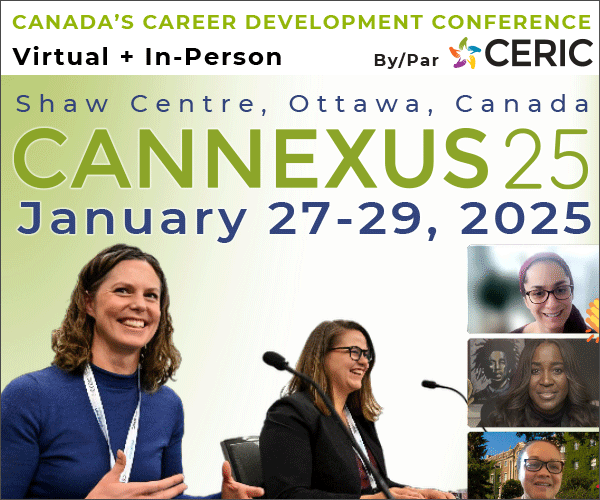Intersections of Career Development and Post Secondary Education for Indigenous Students: Exploring the Integrity of Social and Cultural Issues
Keywords:
career development, post secondary, education, indigenous, indigenous students, social issues, cultural issuesAbstract
Indigenous peoples in Canada often have unique experiences of finding and keeping work, which are strongly tied to cultural and community identity and histories. This paper explores the relationship of career development with post secondary education. These two facets of life for Indigenous peoples seem to intersect around issues of discrimination, modeling and mentoring, and access to education and career opportunities, which are discussed through a review of literature and the presentation of new data from two Indigenous research projects. Implications for career development and educational practices presented offer concrete guidelines for changing the way universities service the career needs of Indigenous students.
References
Assembly of First Nations. (2002). Top Misconceptions About Aboriginal Peoples. Retrieved: January 21, 2010, from http://www.afn.ca.
Barnhardt, R. (2002). Domestication of the Ivory Tower: Institutional Adaptation to Cultural Distance. Anthropology and Education Quarterly, 33 (2), 238-249. Retrieved from http://www.jstore.org.myaccess.library.utoronto.ca/stable/3196175
Battiste, M. (1998). Enabling the autumn seed: Toward decolonized approach to Aboriginal, knowledge, language and education. Canadian Journal of Native Education, 22 (1), 16-27.
Battiste, M. (2002). Indigenous Knowledge and Pedagogy in First Nations Education: A Literature Review with Recommendations. Prepared for the National Working Group on Education and the Minister of Indian Affairs Indian and Northern Affairs Canada, Ottawa, ON
Battiste, M. & Youngblood Henderson, J. (2000). Protecting Indigenous knowledge and heritage: A global challenge.
Saskatoon, SK: Purich Publishing Betz, N.E. (2006). Basic issues and concepts in the career development and counselling for women. In W. B. Walsh & M. J. Heppner (Eds.), Handbook of career counselling for women (2nd ed., pp. 45-7). Mahwah, NJ: Lawrence Erlbaum Associates.
Dickason, O. P. (1997). Canada’s first nations: a history of founding peoples from earliest times. Toronto: Oxford University Press.
Duran, E. (2006). Healing the Soul Wound. New York: Teachers College, Columbia University.
Dwyer, R. J. (2003). Career progression factors of the Aboriginal executives in the Canada federal public service. Journal of Management Development, 22(10), 881-
doi:10.1108/02621710310505476
Erasmus, P. & Ensign, G. (1998). A Practical Framework for Liaison Work in Native Communities. Wetaskiwin, AB: Taylor Printing.
Freire, P. (1970/2003). Pedagogy of the oppressed. New York: Continuum International
Green, H. (1997). May I walk in beauty: First Nations and self-esteem. Guidance Counselling, 12, 2, 22-26.
Garrett, J.T., & Herring, R. (2001). Honoring the power of relation: Counselling native adults. Journal of Humanistic Counseling, Education and Development, 20, 139-161. doi:10.1002/j.2164-490X.2001.tb00113.x
Gone, J. P. (2004). Mental health services for Native Americans in the 21st century United States. Professional Psychology: Research and Practice, 35,1, 10-18. doi:10.1037/0735-7028.35.1.10
Health Canada, First Nations and Inuit Health Branch. (2003). A Statistical Profile on the Health of First Nations in Canada. Retrieved May 15, 2005 from www.library.ubc.ca/xwi7xwa/stats.htm
Herring, R.D. (1997). Multicultural counselling in schools: A synergetic approach. Alexandria, V.A. American counselling association.
Hudson, P. & Taylor-Henley, S. (2001). Beyond the rhetoric: Implementing culturally appropriate research projects in First Nations communities. American Indian Culture and Research Journal, 25, 2, 93- 105. Retrieved from: http://aisc.metapress.com/content/wm706483h416245j/
Human Resources and Skills Development Canada. (2010). Canadians in Context Aboriginal Population. Retrieved from http://www4.hrsdc.gc.ca/.3ndic.1t.4r@-ng.jsp?id=36
Junor, S. & Usher, A. (2004) The Price of Knowledge 2004: Access and Student Finance in Canada. Montreal: Canada Millennium Scholarship Foundation.
Juntunen, C. J., Barraclough, D.J., Broneck, C.L., Seibel, G.A., Winrow S.A., & Morin P.M. (2001). American Indian Perspective on the Career Journey. Journal of Counselling Psychology, 48, 274- 285. doi:10.1037/022-0167.48.3.274
Kawagley, A. O. (1993). A Yupiaq worldview. A pathway to ecology and spirit. Prospect Heights, IL: Waveland Press.
Kenny, C., Faries, E., Fiske, J., & Voyageur, C. (2004). A holistic framework for Aboriginal policy research. Ottawa, ON, Canada: Status of Women Canada.
Kirkness, V. J., & Barnhardt, R. (1991). First Nations and higher education: the four R's Respect, relevance, reciprocity, responsibility. Knowledge across cultures: A contribution to dialogue among civilizations. R. Hayoe and J. Pan, Eds., Comparative Education Research Centre, The University of Hong Kong.
Kirmayer, L. J., Brass, G. M., & Tait, C. L. (2000). The mental health of Aboriginal peoples: Transformations of identity and community. Canadian Journal of Psychiatry, 45, 7, 607-617. Retrieved from http://publications.cpaapc.org/browse/documents/3
Kramer, M.S., Seguin, L., Lydon, J., & Goulet, L. (2000). Socio-economic disparities in pregnancy outcome: Why do the poor fare so poorly? Paediatric and Prenatal Epidemiology, 14 (3), 194-210. doi: 10.1046/j.1365-3016.2000.00266.x
Lamarche, P. A. (1995); Our Health Paradigm in Peril. Public Health Reports, 110. Retrieved September 10, 2006 from http://www.questia.com/PM.qst?a=o&se=gglsc&d=5002244683&er=deny
Lee, C. C. (Ed.)(1995). Counselling for diversity. Needham Heights, MA: Allyn and Bacon.
Malatest & Associates (2002). Best Practices in Increasing Aboriginal Postsecondary Enrolment Rates. Prepared for The Council of Ministers of Education, Canada.
Malone, J. L. (2000). Working with Aboriginal Women: Applying Feminist Therapy in a Multicultural Counselling Context. Canadian Journal of Counselling, 34, 33-42. Retrieved from http://cjc.synergiesprairies.ca/cjc/index.php/rcc/article/viewArticle/153
Marshall, M., Stewart, S., Popadiuk, N., Lawrence, B. (2011in press) Walking in multiple worlds. Successful school-to work transitions for Indigenous and cultural minority youth. In G. Tchibozo (Ed.), Cultural Diversity and Work to Life Transitions (pp. 88- 118). Champagne IL: Common Ground.
Martin, W.E. & Farris, K.K. (1994). A Cultural and Contextual Decision Path to Career Assessment with Native Americans: A Psychological Perspective. Journal of Career
Assessment, 2(3), 258-275. DOI:10.1177/106907279400200305
Milloy, J.S. (1999). A national crime: The Canadian government and the residential school system, 1879-1986.Winnipeg; University of Manitoba Press.
McCormick, R. (1997). Healing through interdependence: The role of connecting in First Nations healing practices. Canadian Journal of Counselling, 31 (3), 172-184. Retrieved From http://eric.ed.gov:80/ERICWebPortal/search/detailmini.jsp?nfpb=true&_&ERICExtSearch_SearchValue_0=EJ555251&ERICExtSearch_SearchType_0=no&accno=EJ555251
Minnick, E. (1990). Transforming knowledge. Philadelphia, PA: Temple UniversityPress.
Mussell, W. J., Nichols, W. M., & Adler, M. T. (1993). Meaning Making of Mental Health Challenges in First Nations: A Freirean Perspective (2nd Edition). Chilliwack, BC:
Sal’i’shan Institute Society. Pedersen, P.B. (1991). Multiculturalism as a generic approach to counseling. Journal of Counseling & Development, 70, 6-12. doi 10.1002/j.15566676.1991.tb01555.x
Royal Commission on Aboriginal Peoples. (1994). The High Arctic Relocation: A Report on the 1953-55 Relocation. Ottawa, ON: Minister of Supply and Services.
Royal Commission on Aboriginal Peoples. (2004). Highlights from the Report of the Royal Commission on Aboriginal Peoples. Ottawa: Ministry of Supply and Service.
Smith, L. T. (1999). Decolonizing Methodologies: Research and Indigenous Peoples. New York: Zed Books.
Statistics Canada (2003). Retrieved on May 01, 2005 from http://www12.statcan.ca/english/census01.
Statistics Canada (2003). 2001 Census: analysis series. Education in Canada: Raising the standard. Retrieved on March 12, 2008 from http://www12.statcan.ca/english/census01/Products/Analytic/companion/educ/pdf/96F0030XIE2001012.pdf
Stewart S. & Reeves, A. (2009, January). Decolonizing graduate school: Exploring the successes of Indigenous graduate students in Canada. Paper presented at the Hawaii International Conference on Education, Honolulu, HI.
Stewart, S., Reeves, A., Mohanty, S., & Syrette, J. (2011, June) Indigenous Mental Health: Career and Education as Part of Overall Healing. Paper presented at the Canadian Psychological Association Convention, Toronto, ON.
Thomason, T.C. (1999). Psychological and Vocational Assessment of Native Americans. ERIC Document ED432428. Greensboro, NC: ERIC Clearinghouse on Counseling and Student Services.
Waldram, J. B. (2004). Revenge of the Windigo: The Construction of the Mind and Mental Health of North American Aboriginal Peoples. Toronto: University of Toronto Press.
Wenzel, E. (1997). Environment, development and health. Ideological metaphors of post traditional societies? Health Education Research, 12 (4), 403-418. Retrieved from http://her.oxfordjournal.org/content/12/4/403.1.short
Young, T. K. (1988). Health Care and Cultural Change: The Indian Experience in the Central Sub-Arctic. Toronto: University of Toronto Press.

Downloads
Published
How to Cite
Issue
Section
License

This work is licensed under a Creative Commons Attribution-NonCommercial-NoDerivatives 4.0 International License.














